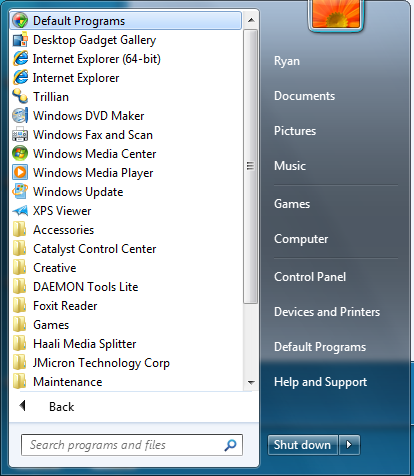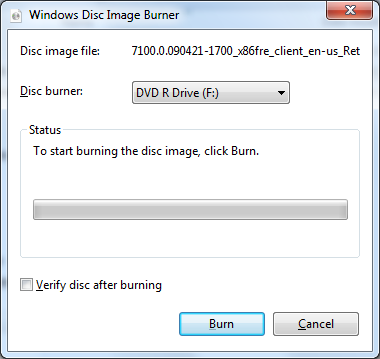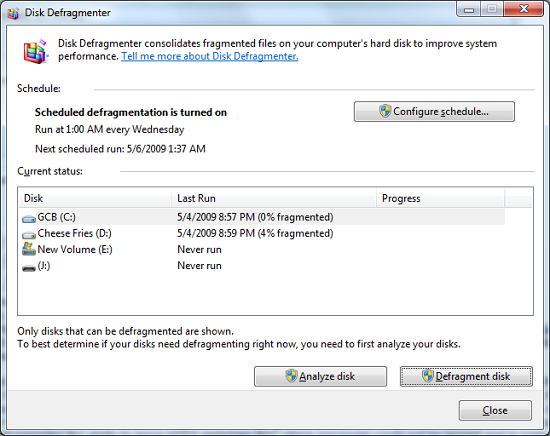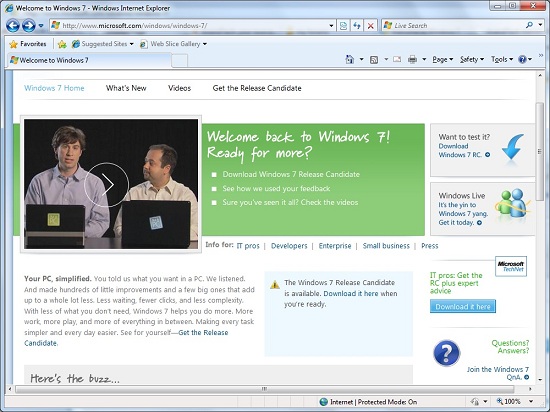Windows 7: Release Candidate 1 Preview
by Ryan Smith and Gary Key on May 5, 2009 11:00 PM EST- Posted in
- Systems
Internet Explorer 8 and the Rest
Rounding out our look at Windows 7’s applications, we have Internet Explorer 8. Recently released for both Vista and XP, IE8 is the latest salvo in the ongoing browser wars between Microsoft, Mozilla, Apple, Google, and Opera. We’re not going to go too in-depth here since it’s not a Windows 7-only feature and we’ll be doing a proper review soon, but as the default Windows browser it’s best to quickly hit on the high points.
Microsoft has taken a lot of well-earned flak for the compatibility of previous versions of Internet Explorer. As far as rendering and adherence to web standards goes, IE has been off in its own little world. Microsoft has finally taken a number of steps to resolve that, making IE behave in a much more standards-compliant manner, even though it breaks sites designed for IE’s previously quirky behavior when those sites don’t explicitly ask for IE to use that behavior (i.e. compatibility mode). It’s still not the most compliant browser out there, but it’s a great deal improved from where it was.
Furthermore the rise of AJAX and other JavaScript-heavy application types has necessitated the need for better JavaScript performance in IE, with IE picking up a garbage collector for JavaScript along with a higher performing JavaScript interpreter. Also new in IE8 is a privacy mode (InPrivate), a new type of search feature Microsoft is calling Accelerators, and separate processes for each tab to keep malfunctioning tabs from bringing down the rest. We’ll have a full work-up of IE8 later this month to look at these features in-depth, so stay tuned.
Meanwhile when it comes time to talk about the rest of the applications, Windows 7 is unusually bare. Microsoft has finally gotten around to following through with their desire to decouple some of the standard Windows applications from the operating system itself, so that they can upgrade the applications separately from the OS. As a result, the following applications are no longer included in Windows as of Windows 7: Mail, Calendar, and Movie Maker.

Missing: Half the applications that should come with the OS
All of them have been spun-off into Microsoft’s Windows Live service (joining previously spun-off Messenger) as part of what Microsoft is calling the Windows Live Essentials pack. While there’s probably a good reason for doing it exactly this way (it’s hard to add features when you’re a convicted monopolist) it’s little consolation to the fact that it makes Windows 7 extremely confusing to use. An operating system without an email client or a calendaring application? What is this, 1995? And what about IE? It’s decoupled from the OS too, and yet it’s still included by default.
At least with Vista and its spun-off Messenger, Microsoft replaced Messenger with a link to the Windows Live website to download it. However with Windows 7 there’s absolutely no indication of where they went unless you start searching the help files. We’ll cut Microsoft some slack here since this is just a Release Candidate, but if this is how they intend to ship the final version (and it probably is) then there is likely to be a number of confused users once Windows 7 launches.

One Windows Live Essential install later, and we have Mail
One notable addition to Windows 7 is that Windows has finally gained some basic ISO disc image handling abilities. Unfortunately it’s not the ability to mount them as a virtual drive like Mac OS X can, but Windows 7 at least gets it half-right by getting the ability to burn them. The new Windows Disc Image Burner fulfills exactly this role, and is invoked by right-clicking on ISO files. It may not sound fancy, but with software increasingly being distributed on ISOs these days (including Windows 7 RC1 itself) it’s undoubtedly handy.

We can't mount them, but at least we can burn them
Last but not least, Disk Defragmenter has received an overhaul in looks and features in coming from Vista. With respect to looks, Microsoft hid the fragmentation status of a hard drive in Vista on the belief that users found it to be superfluous information, and they have restored that information for Windows 7 after receiving negative feedback in order to satiate the power users who wanted that missing information. With respect to features, Microsoft has given Disk Defragmenter the ability to move NTFS metadata files, which previously could not be moved and in some situations unnecessarily blocked the shrinking of partitions as a result. Disk Defragmenter is now also capable of recognizing SSDs, and will block the defragmentation of those disks since defragmenting is of no use due to wear-leveling algorithms.

The new Disk Defragmenter











121 Comments
View All Comments
Lexington02 - Wednesday, May 6, 2009 - link
He is not late, he is claiming otherwise to the other people who think that Anandtech is MS loving while this dude is claiming to be Apple loving. I wonder, which is true... Apple lovers or Microsoft lovers...Lexington02 - Wednesday, May 6, 2009 - link
He is not late, he is claiming otherwise to the other people who think that Anandtech is MS loving while this dude is claiming to be Apple loving. I wonder, which is true... Apple lovers or Microsoft lovers...Ryan Smith - Thursday, May 7, 2009 - link
From my perspective, if I'm being accused of being an Apple and a Microsoft fanboy in the same article, then I must be doing something right.;-)I'll note that I have a preference for Mac OS X if given a choice, but I'm getting ahead of myself. I'll talk more about that in next week's Ubuntu article.
strikeback03 - Thursday, May 7, 2009 - link
That was my point - I have long stated that 90% of the articles here that compare something generate comments from both sides claiming bias each way. So the anti-Apple comments were late arriving compared to the anti-MS ones.Are we really going to get a Ubuntu article? Is it now on the transition to 9.04 instead of 8.04?
Ryan Smith - Thursday, May 7, 2009 - link
8.04 (because it's the LTS and most comparable to Windows/Mac OS X as such), to be followed up with 9.04.strikeback03 - Thursday, May 7, 2009 - link
Cool. 9.04 finally resolved some out-of-the-box compatibility problems my desktop has had with each release since I started (6.10)Gary Key - Thursday, May 7, 2009 - link
I am still a big fan of DR-DOS. Does that mean I am anti-MS also? :)MichaelD - Wednesday, May 6, 2009 - link
This is important for me as that's what I use for an AV/AM solution. Overall, it looks very impressive, particularly for a RC; it may just get me away from XP.masterbm - Wednesday, May 6, 2009 - link
I have been using windows 7 on my old amd socket 939 4200 4gb ram 8800gs. I started since build 7000. I started out being guy how felt that I was going to stay on vista for most of my machine I will upgrade to windows when it released. My htpc/file server at this time I plan on leaving it at vista. Due to their is no really good way to convert the .wtv format. This htpc box is automated in since it defrag it self scan it self for virus and spyware. Then It just added auto convert of the show that records. I took while to do that stuff not sure if want do every again.(also note htpc is amd 3800)The other thing I will note is that windows 7 becuase it feels snappier has made use that system more then use tofausto412 - Wednesday, May 6, 2009 - link
They need to make the defrag problem able to do more than one drive at a time...or to schedule them out.